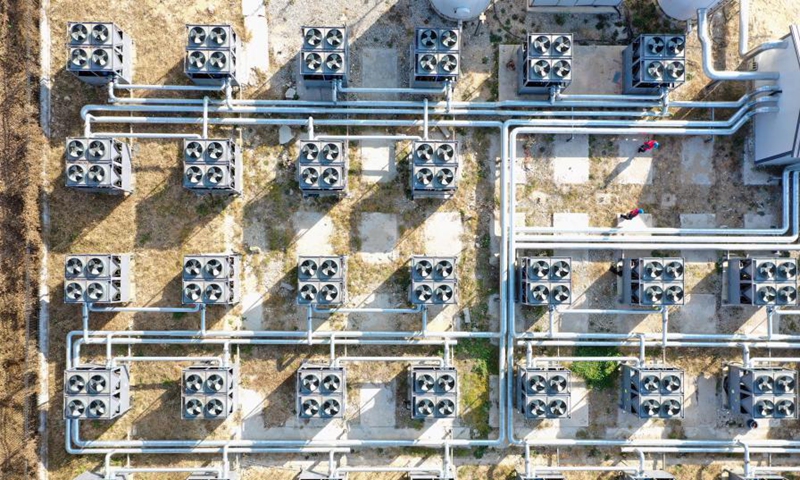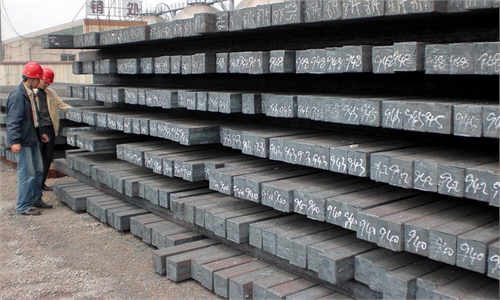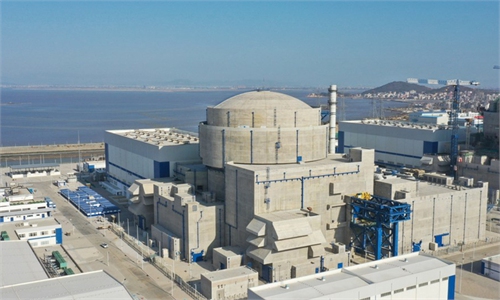
Aerial photo taken on Nov. 12, 2020 shows a heating station with clean energy at Wendeng district in Weihai, east China's Shandong Province. (Xinhua/Zhu Zheng)
Against the backdrop of China's commitment to build a green economy and achieve its long-term carbon emissions goal by 2030, leading companies are ramping up efforts to reduce carbon emissions, and some have already come up with explicit targets.
Eight cities and provinces have pledged to either achieve the goal of peak carbon dioxide emissions by 2030 or to help some cities and industries achieve the goal in advance, media reports said.
Several large and representative companies in the electricity, transportation and other clean energy sectors that the Global Times reached on Tuesday said that they have already formulated plans to reach the goal of carbon neutrality.
The State Grid Hunan Electric Power Co based in Central China's Hunan Province, for example, will invest more in energy conservation.
The company aims to accelerate the transformation of clean and low-carbon energy, including putting 4.5 megawatts of energy storage into use and reducing 1.26 billion kilowatt-hours of electricity that is otherwise lost from new-energy sources, according to a statement that the company sent to the Global Times on Tuesday.
The China State Railway Group Co will use more electric locomotives on a daily basis to move toward the carbon neutrality target.
The electrification rate of the national railway system is 74.9 percent. It is estimated that this year, freight volume will reach 3.7 billion tons, and the traction work completed by electric locomotives will reach 90.5 percent, according to a company statement sent to the Global Times on Tuesday.
Local governments are also revealing detailed targets amid the two sessions.
South China's Guangdong Province is putting more effort into air quality improvement by shutting down coal-fired units and power stations, and banning diesel trucks that don't meet carbon emissions standards. The province aims to cut volatile organic compounds (VOC) emissions by about 3 percent this year, and promote the replacement of low VOC raw materials and auxiliary materials by the end of 2021.
Another target this year is to complete sewage treatment systems for up to 1,000 villages and speed up work on a survey of drainage facilities in more than 50,000 villages. The province will monitor water quality in corresponding facilities that treat up to 20 tons of water per day.
Guangdong is also formulating a positive list for units that are doing a good job in reducing carbon emissions.
China's financial hub Shanghai issued its 14th Five-Year Plan (2021-25) for economic and social development and outlined its long-term goals for 2035. The city aims to bring carbon dioxide emissions to a peak before 2025, five years ahead of the national target.
The city will promote clean energy and energy efficiency, and total coal consumption will be capped at about 43 million tons by 2025.The share of local renewable energy in total electricity consumption will increase to around 8 percent, according to the local authorities.
Currently, the carbon emission rights trade is "adjusted by the market," Zhou Jun, head of the division of atmospheric environment and climate change of the Shanghai Bureau of Ecology and Environment, told the Global Times on Tuesday.
For instance, out of 105 million tons of carbon emission quotas in 2020, each company gets a quota. If a firm emits more carbon dioxide than its quota, it needs to buy more quotas on the market.
If a firm fails to fulfill its commitment, it will also pay penalties and its credit will also be affected, Zhou said, noting that, under this mechanism, enterprises have to seek measures such as increasing use of renewable energy and developing climate-smart technologies to lower carbon emissions.



